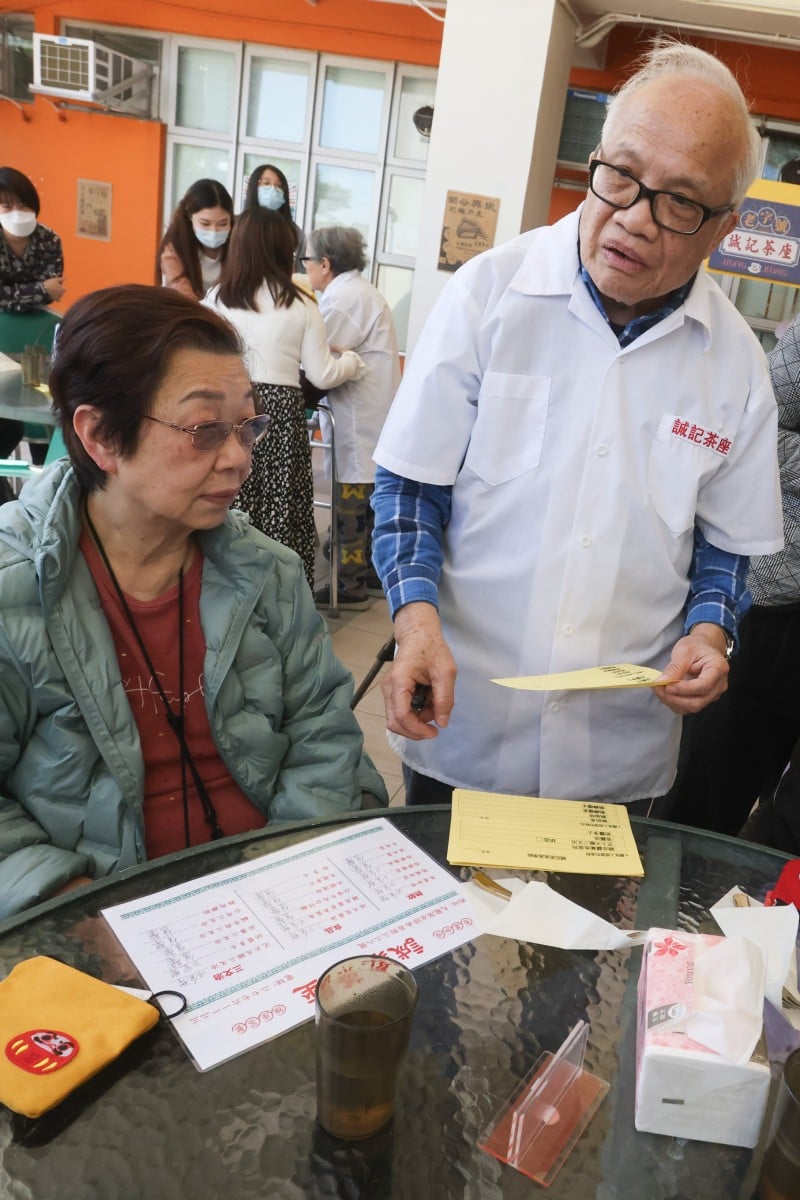
- Shing Kee Cafe at the HKSKH Li Ka Shing Care and Attention Home for the Elderly has the patients take orders, cook food and serve customers
- Occupational therapist behind the cognitive training project was inspired by Japanese memory cafes
 Dementia patient Leung Kam-chiu, 79, takes orders at Shing Kee Cafe’s launch ceremony. Photo: Jonathan Wong
Dementia patient Leung Kam-chiu, 79, takes orders at Shing Kee Cafe’s launch ceremony. Photo: Jonathan WongShing Kee Cafe is filled with the aroma of warm pineapple buns and servers wearing crisp white uniforms dish out orders from vintage menus. The eatery is a food spot with a difference – it is on the porch of a care home and its elderly staff all have dementia.
HKSKH Li Ka Shing Care and Attention Home for the Elderly in Shek Kip Mei launched the first-of-its-kind cognitive training project earlier this week to support its elderly residents with dementia.
In 2017, 100,000 residents above the age of 60 had dementia in Hong Kong, with authorities estimating the figure could pass 300,000 in 2039 with the city’s fast-greying population.
Research by Chinese University in 2021 found the prevalence rate of dementia to be 5 per cent for people aged 60 and above, and as high as 47.5 per cent for those aged 85 and above.
Shing Kee Cafe, which has three tables, is only open to care home residents for the time being.
As care home workers wheeled residents to the porch, eight cafe “staff” rolled up their sleeves to welcome their first batch of patrons.
Hong Kong teen designs award-winning app for elderly with dementia
Two residents took orders, while the rest were busy making toast and sandwiches, reheating pineapple buns and curry fishballs and brewing drinks from two kiosks with the help of student volunteers and care home staff.
After finishing their food, patrons paid the “boss” – another resident – at a small counter with game coins.
Occupational therapist Yancy Chu Mung-yan, who is in charge of the programme, said she was inspired by Japan’s memory cafes, operated by elderly dementia sufferers, and started preparations in December.
“Compared with our regular cognitive training, this is more engaging for both patrons and staff because it is a group activity, allowing them to interact and communicate with each other,” she said.
Chu said they selected residents who had experience in making food and conducted simple training and trials beforehand.
To ensure they could handle the work, each resident was paired with one staff member or a volunteer to help them, and smaller kettles were chosen.
People in Hong Kong are living longer, but extra time comes with disabilities
“Many elderly residents showed signs of social withdrawal after the pandemic because they were too scared of getting infected, so it took some time for us to encourage them to join this activity,” Chu said.
She said the short-term memory, attention and communication ability of those joining the activity had significantly improved compared with the early stages of training.
“Dementia impairs one’s speech, affecting vocabulary, response and talking speed, but the activity encourages them to speak more because they need to work with each other at the booths.”
The care home will hold the activity once or twice a month with a different menu every time. Each session lasts about two hours.
Chu said the home was exploring the possibility of turning the programme into a real business in the long run, opening Shing Kee Cafe to residents’ families.
Leung Kam-chiu, a 79-year-old resident, spent the afternoon taking orders. The retired nurse said he felt satisfied to serve people again. “This is easy for me, I could take some harder challenges next time,” he said.
Wong Shui-ying, 93, one of the oldest cafe workers, was in charge of making toast. The former owner of a dai pai dong also helped to design the menus and workflows at the booths.